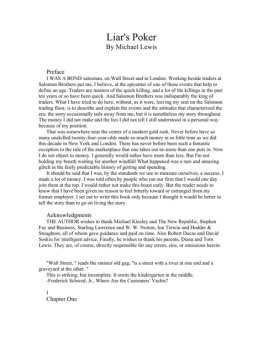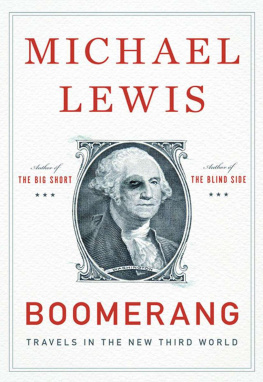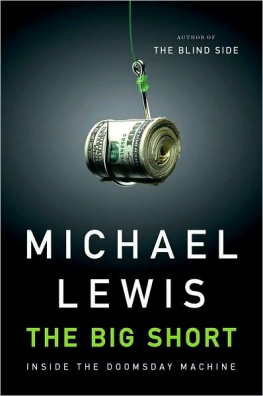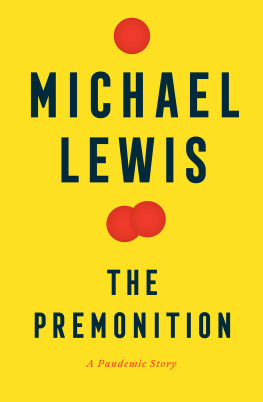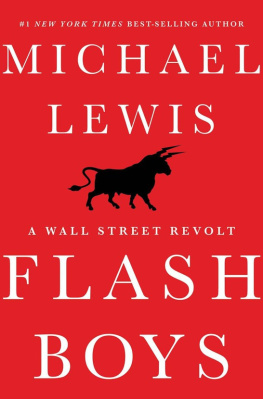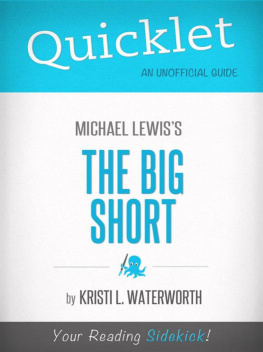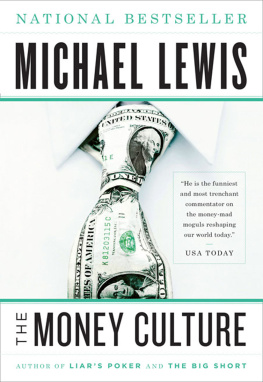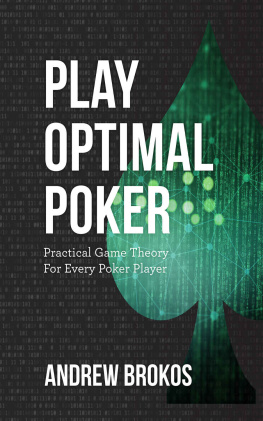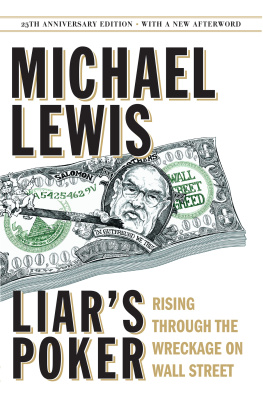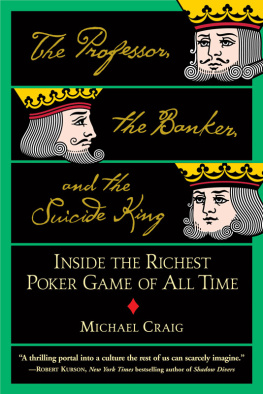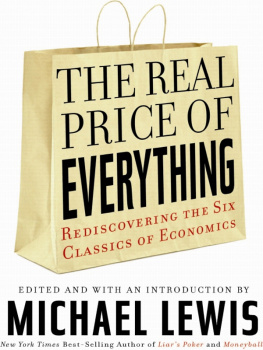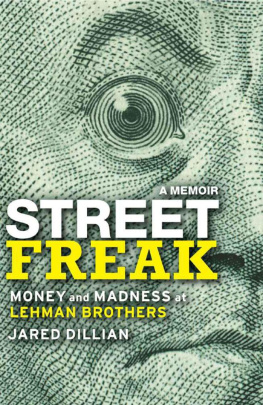Liar's Poker
By Michael Lewis
Preface
I WAS A BOND salesman, on Wall Street and in London. Working beside traders at Salomon Brothers put me, I believe, at the epicenter of one of those events that help to define an age. Traders are masters of the quick killing, and a lot of the killings in the past ten years or so have been quick. And Salomon Brothers was indisputably the king of traders. What I have tried to do here, without, as it were, leaving my seat on the Salomon trading floor, is to describe and explain the events and the attitudes that characterized the era; the story occasionally tails away from me, but it is nonetheless my story throughout.
The money I did not make and the lies I did not tell I still understood in a personal way because of my position.
That was somewhere near the center of a modern gold rush. Never before have so many unskilled twenty-four-year-olds made so much money in so little time as we did this decade in New York and London. There has never before been such a fantastic exception to the rule of the marketplace that one takes out no more than one puts in. Now I do not object to money. I generally would rather have more than less. But I'm not holding my breath waiting for another windfall What happened was a rare and amazing glitch in the fairly predictable history of getting and spending.
It should be said that I was, by the standards we use to measure ourselves, a success. I made a lot of money. I was told often by people who ran our firm that I would one day join them at the top. I would rather not make this boast early. But the reader needs to know that I have been given no reason to feel bitterly toward or estranged from my former employer. I set out to write this book only because I thought it would be better to tell the story than to go on living the story.
Acknowledgments
THE AUTHOR wishes to thank Michael Kinsley and The New Republic, Stephen Fay and Business, Starling Lawrence and W. W. Norton, Ion Trewin and Hodder & Stoughton, all of whom gave guidance and paid on time. Also Robert Ducas and David Soskin for intelligent advice. Finally, he wishes to thank his parents, Diana and Tom Lewis. They are, of course, directly responsible for any errors, sins, or omissions herein.
"Wall Street, " reads the sinister old gag, "is a street with a river at one end and a graveyard at the other. "
This is striking, but incomplete. It omits the kindergarten in the middle.
-Frederick Schwed, Jr., Where Are the Customers' Yachts?
I
Chapter One
Liars Poker
IT WAS sometime early in 1986, the first year of the decline of my firm, Salomon Brothers. Our chairman, John Gutfreund, left his desk at the head of the trading floor and went for a walk. At any given moment on the trading floor billions of dollars were being risked by bond traders. Gutfreund took the pulse of the place by simply wandering around it and asking questions of the traders. An eerie sixth sense guided him to wherever a crisis was unfolding. Gutfreund seemed able to smell money being lost.
He was the last person a nerve-racked trader wanted to see. Gutfreund (pronounced Good friend) liked to sneak up from behind and surprise you. This was fun for him but not for you. Busy on two phones at once trying to stem disaster, you had no time to turn and look. You didn't need to. You felt him. The area around you began to convulse like an epileptic ward. People were pretending to be frantically busy and at the same time staring intently at a spot directly above your head. You felt a chill in your bones that I imagine belongs to the same class of intelligence as the nervous twitch of a small furry animal at the silent approach of a grizzly bear. An alarm shrieked in your head: Gutfreund! Gutfreund! Gutfreund!
Often as not, our chairman just hovered quietly for a bit, then left. You might never have seen him. The only trace I found of him on two of these occasions was a turd-like ash on the floor beside my chair, left, I suppose, as a calling card. Gutfreund's cigar droppings were longer and better formed than those of the average Salomon boss. I always assumed that he smoked a more expensive blend than the rest, purchased with a few of the $40 million he had cleared on the sale of Salomon Brothers in 1981 (or a few of the $3. 1 million he paid himself in 1986, more than any other Wall Street CEO).
This day in 1986, however, Gutfreund did something strange. Instead of terrifying us all, he walked a straight line to the trading desk of John Meriwether, a member of the board of Salomon Inc. and also one of Salomon's finest bond traders. He whispered a few words. The traders in the vicinity eavesdropped. What Gutfreund said has become a legend at Salomon Brothers and a visceral part of its corporate identity. He said: "One hand, one million dollars, no tears."
One hand, one million dollars, no tears. Meriwether grabbed the meaning instantly.
The King of Wall Street, as Business Week had dubbed Gutfreund, wanted to play a single hand of a game called Liar's Poker for a million dollars. He played the game most afternoons with Meriwether and the six young bond arbitrage traders who worked for Meriwether and was usually skinned alive. Some traders said Gutfreund was heavily outmatched. Others who couldn't imagine John Gutfreund as anything but omnipotent-and there were manysaid that losing suited his purpose, though exactly what that might be was a mystery.
The peculiar feature of Gutfreund's challenge this time was the size of the stake.
Normally his bets didn't exceed a few hundred dollars. A million was unheard of. The final two words of his challenge, "no tears, " meant that the loser was expected to suffer a great deal of pain but wasn't entitled to whine, bitch, or moan about it. He'd just have to hunker down and keep his poverty to himself. But why? You might ask if you were anyone other than the King of Wall Street. Why do it in the first place? Why, in particular, challenge Meriwether instead of some lesser managing director? It seemed an act of sheer lunacy. Meriwether was the King of the Game, the Liar's Poker champion of the Salomon Brothers trading floor.
On the other hand, one thing you learn on a trading floor is that winners like Gutfreund always have some reason for what they do; it might not be the best of reasons, but at least they have a concept in mind. I was not privy to Gutfreund's innermost thoughts, but I do know that all the boys on the trading floor gambled and that he wanted badly to be one of the boys. What I think Gutfreund had in mind in this instance was a desire to show his courage, like the boy who leaps from the high dive. Who better than Meriwether for the purpose? Besides, Meriwether was probably the only trader with both the cash and the nerve to play.
The whole absurd situation needs putting into context. John Meriwether had, in the course of his career, made hundreds of millions of dollars for Salomon Brothers. He had an ability, rare among people and treasured by traders, to hide his state of mind. Most traders divulge whether they are making or losing money by the way they speak or move.
They are either overly easy or overly tense. With Meriwether you could never, ever tell.
He wore the same blank half-tense expression when he won as he did when he lost. He had, I think, a profound ability to control the two emotions that commonly destroy tradersfear and greedand it made him as noble as a man who pursues his self-interest so fiercely can be. He was thought by many within Salomon to be the best bond trader on Wall Street. Around Salomon no tone but awe was used when he was discussed. People would say, "He's the best businessman in the place," or "the best risk taker I have ever seen," or "a very dangerous Liar's Poker player."
Meriwether cast a spell over the young traders who worked for him. His boys ranged in age from twenty-five to thirty-two (he was about forty). Most of them had Ph.D.'s in math, economics, and/or physics. Once they got onto Meriwether's trading desk, however, they forgot they were supposed to be detached intellectuals. They became disciples. They became obsessed by the game of Liar's Poker. They regarded it as their game. And they took it to a new level of seriousness.
Next page
